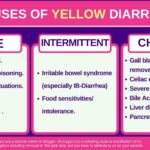9 Causes of Diarrhea Every Day (But not Sick) & When to Worry.
Our content is not intended nor recommended as a substitute for medical advice by your doctor. Use for informational purposes only.
Possible causes of diarrhea every day in otherwise healthy individuals:
- Food intolerances such as lactose intolerance and fructose intolerance.
- Medications such as metformin and antibiotics.
- Mild forms of Irritable bowel syndrome.
- Mild chronic digestive infections.
- Bile acid diarrhea.
- Post-cholecystectomy diarrhea
- Pancreatic conditions.
- Diabetes-related diarrhea.
- Celiac disease and non-celiac gluten sensitivity.
- Others include colorectal cancer, hyperthyroidism, anxiety, inflammatory bowel disease, SIBO, etc.
1. Lactose intolerance.
Food intolerance is difficulty digesting particular food leading to symptoms such as diarrhea, gas, and abdominal pain.
The most widespread type of food intolerance is the inability to digest lactose.
How common is lactose intolerance?
Lactose is the primary sugar in milk and dairy products such as (ice cream, yogurt, cheese, etc.).
Surprisingly, about two-thirds (about 65%) of the world population develop lactose intolerance as adults.
Why is it so common?
Lactose intolerance is often a result of the enzyme (lactase) responsible for the breakdown and digestion of lactose.
Most people lose their natural lactose enzymes in the intestine by becoming adults. A phenomenon called (developmental lactose intolerance).
Lactose intolerance is extremely high among certain races, such as African Americans, Hispanics, and Asians.
Symptoms:
Lactose intolerance symptoms will occur daily if you consume milk or other dairy products.
The most common symptoms include:
- Diarrhea every day with or without other symptoms.
- Bloating.
- Distension, flatulence.
- Loose poop (often yellowish or pale brown).
- Nausea.
- Stomach pain.
The symptoms of lactose intolerance can range from mild to extreme forms of diarrhea, vomiting, and abdominal pain.
Consider lactose intolerance if you have diarrhea daily without other sickness feelings or symptoms.
Lactose intolerance is commonly associated with multiple symptoms (bloating, nausea, cramps, and diarrhea). However, some cases may present with diarrhea daily without being sick or complaining of other symptoms.
2. Other forms of food intolerance.
Lactose intolerance is the most widespread type of food intolerance. However, intolerance can occur to various foods and food substances.
For example, 75% of people will develop digestive symptoms (such as diarrhea daily) when eating 40-80 grams of fructose (found in most fruits and honey).
Consumption of the offending foods will cause diarrhea after eating. Diarrhea may become explosive in severe cases or after consuming much of the offending food.
Examples of food intolerances that can cause diarrhea after eating:
- Gluten sensitivity (celiac disease and non-celiac gluten sensitivity).
- Fructose intolerance (present in fruits and honey).
- Salicylate intolerance (occur naturally in many fruits, vegetables, and spices).
- Intolerance to food additives such as artificial colorings, artificial flavorings, and artificial sweeteners.
- Caffeine intolerance.
- Amines intolerance (produced by bacteria during food storage and fermentation).
- AIcohoI intolerance.
Learn more about food intolerances.
3. Medications that can cause diarrhea every day.
More than 700 medications can lead to diarrhea. Some cause acute or transient forms of diarrhea. Others may cause chronic diarrhea every day for long periods.
Many of these medications can be taken for long periods. However, drugs are often overlooked as a cause of diarrhea every day (especially if you are not sick).
Review your list of chronic or recently used medications for:
- Metformin.
It is a widely used anti-diabetes medication and is considered the first-line therapy for new cases.
Metformin-induced diarrhea is a widespread side effect of the drug. Check your anti-diabetes tables, as they can be the source of unexplained diarrhea. - Antibiotics.
Antibiotic-associated diarrhea is a frequent side effect of taking antibiotics. This is because antibiotics cause the death of beneficial microbes inside your gut, disturbing digestion and allowing other harmful organisms to grow.
Common antibiotics to cause such conditions are Penicillin, cephalosporins, and clindamycin. - Gastritis and GERD medications:
– Proton Pump Inhibitors such as Esomeprazole (Nexium), Pantoprazole (Protonix), and Omeprazole (Prilosec).
– H2 blockers such as Famotidine and Ranitidine (Zantac). - Chemotherapy.
Used in cancer treatment. - Immunosuppressive medications.
These medications treat immune-mediated diseases such as Systemic Lupus, Rheumatoid Arthritis, Immune Thrombocytopenic Purpura, and others.
Examples include Mycophenolate and Methotrexate. - Furosemide (Lasix):
A famous diuretic medication is used in various diseases, especially in people with heart disease. - Chronic laxative abuse.
For the complete list, Learn more HERE and HERE.
4. Mild forms of diarrhea-predominant IBS.
Irritable bowel syndrome is a prevalent condition. IBS affects about 10-15% of the world’s population (ref).
IBS is recurrent abdominal pain (at least one day per week for the past three months). The onset of pain is associated with at least 2 of the following (reference):
- Defecation: the pain either resolves or increases with bowel movements.
- Change in stool form: with the onset of pain, the stool becomes harder or looser.
- Change in stool frequency: diarrhea or constipation.
Learn How doctors diagnose IBS HERE.
IBS symptoms, such as abdominal pain, are minimal or transient for many people. The pain can be mild and improves instantly after bowel motions.
This leaves chronic diarrhea daily, the main complaint of many IBS sufferers.
One study found that about 60% of people matching the diagnostic criteria of IBS don’t know they have the condition as the symptoms are mild and intermittent (reference).
Either food or stress triggers IBS with diarrhea. IBS diarrhea after eating is related to a famous group of food called FODMAPs (Fermentable Oligo-, Di-, Monosaccharides, And Polyols).
Common Examples of food that trigger Explosive diarrhea after eating with IBS:
- Wheat, barley, rye.
- Onion, garlic, and legumes.
- Lactose in ice cream, custard, yogurt, and other dairy products.
- Fructose is present in apples, pears, mangoes, and honey.
- Artificial sweeteners such as sorbitol, mannitol, and xylitol.
- Alcohol, caffeine.
- Beans.
The complete list of food that triggers IBS is here.
Consult your doctor if you think the everyday diarrhea is due to IBS.
5. Celiac disease.
Celiac disease is a form of food allergy. It is a common disease affecting 1% of the world population (reference).
With celiac disease, your body is intolerant to a protein called “gluten.” Gluten is found mainly in:
- Wheat and wheat-based foods such as bread.
- Rye.
- Barley.
A small intestinal inflammation with malabsorption develops after eating gluten-containing foods. In addition, celiac disease can cause diarrhea every day for prolonged periods.
Initially, the symptoms may be very mild with only choric diarrhea without other sickness or significant symptoms.
Symptoms suggesting celiac disease:
- The usual age of onset is between 20-30 years of age. But it can occur in older ages up to 70 years.
- Abdominal pain and bloating.
- Constant diarrhea.
- Diarrhea can also be intermittent or not present. Constipation can also occur.
- Nausea and vomiting.
- Weight loss.
- Easy fatigue and iron deficiency anemia.
- Itchy, blistery skin.
- Osteoporosis and osteomalacia (body aches).
Celiac disease is diagnosed by a blood test or by taking a biopsy from the small intestine.
Call your doctor if you suspect celiac disease. Learn more.
6. Mild chronic gut infections.
Recurrent or persistent infections can lead to constant diarrhea. The most common persistent conditions that can cause continuous diarrhea are (reference):
- Closteroides difficile.
- Aeromonas.
- Giardia.
- Amebae.
- Campylobacter.
- Cryptosporidium.
- Cyclospora.
- Whipple’s disease.
This form of diarrhea is usually severe watery and constant diarrhea for years. In addition, it may lead to complications such as malabsorption and weight loss.
Chronic infectious diarrhea is more common in people with weak immune systems. Examples are patients receiving chemotherapy, immunosuppressive medications, and people with HIV.
Your doctor usually needs to do a stool culture or take an aspirate from the small intestine or the colon to detect the causative organism.
7. Others.
The causes possible causes of chronic diarrhea every day are numerous. The complete list and their relative frequency are in the table below.
Always consult your doctor if you have significant diarrhea every day for long periods.
| Frequency | Causes of chronic or constant diarrhea |
| 1- Common | 1. IBS-diarrhea 2. Bile acid diarrhea 3. Diet (Food Intolerance) 3. Colonic Tumors (Cancers and benign tumors) 4. Inflammatory bowel diseases 5. Celiac disease 6. Drugs 7. Recurrent Clostridioides (formerly Clostridium) difficile diarrhea 8. Overflow diarrhea |
| 2- Infrequent | 1. Small bowel bacterial overgrowth 2. Mesenteric ischemia 3. Lymphoma 4. Surgical causes (e.g., small bowel resections, fecal incontinence, internal fistula) 5. Chronic pancreatitis 6. Radiation enteropathy 7. Pancreatic carcinoma 8. Hyperthyroidism 9. Diabetes 10. Giardiasis (and other chronic infection) 11. Cystic fibrosis |
| 3- Rare | 1. Rare small intestinal diseases (e.g., Whipple’s disease, tropical sprue, amyloid, intestinal lymphangiectasia) 2. Hypoparathyroidism 3. Addison’s disease 4. Hormone secreting tumors (VIPoma, gastrinoma, carcinoid) 5. Autonomic neuropathy 6. Factitious diarrhea 7. Brainerd diarrhea (possible infectious cause not identified) |
- Evidence-based
- Written by a doctor.

Related Posts:
- Black Watery Diarrhea: 5 Causes & When To Worry.
- Why Do I Feel Sick Every Time I Eat? (8 Commonest Causes).
- How To Cure IBS In One Day (9 most effective strategies)
- Blood On The Outside Of The Stool: 7 Causes & When To Worry.
- 7 Causes Of Blood In Stool With IBS & When To Worry.
- When to worry about ALT levels? Gastroenterologist Explains.






